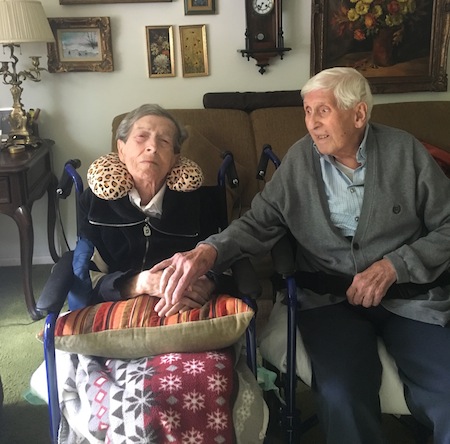Eliezer Sobel created L’Chaim: Pictures to Evoke Memories of Jewish Life with his parents in mind. (photo from Shutterstock)
Eliezer Sobel’s new book, L’Chaim: Pictures to Evoke Memories of Jewish Life, was born from personal experience.
Sobel is an artist at heart and has spent his life finding ways to interact with people – through writing, facilitating workshops and running retreats over the past three decades. Three years ago, on his parents’ 67th anniversary, things took a turn for the worse.
“My mother is in her 17th year of Alzheimer’s and is 93,” Sobel told the Independent. “My dad was fine and taking care of her at home until he was 90. On their 67th wedding anniversary, he fell down the stairs. He fell on his head and almost died. Overnight, there were two dementia patients in the house.
“Prior to that, he was driving, cooking and shopping, as well as hiring and handling the payroll for a team of seven aides. He was amazing with it. Suddenly, overnight, I had a brain-damaged dad at 90 years old.”
Sobel and his wife lived in Virginia at the time, which is seven to eight hours away from New Jersey, where his parents lived. After the accident, however, they moved into his parents’ home.

“We stayed in the house for 10 months, taking care of my parents and trying to get the right kind of help in the house that would enable us to eventually move out,” explained Sobel. “But we stayed nearby so we could monitor and manage the scene.”
His dad recovered a substantial amount of his cognitive and physical ability, but passed away this past November.
The work on the book goes back to 2011. “She didn’t speak English words anymore,” said Sobel of his mother at the time. “She would sometimes make up her own language and sounds. She stopped reading, as far as we knew.
“One day, I came upon her accidentally…. She was flipping through a magazine and I overheard her reading the big print headlines out loud, in English, correctly. I was totally floored. Mom can still read, even if it’s just a three-word phrase.”
Sobel wanted to run out and buy his mom a picture book, one designed for Alzheimer’s and dementia sufferers, but he couldn’t find one anywhere. His next thought was to use a children’s picture book, but he was unsure whether his mother could negotiate a book with a storyline. He wanted each page to stand on its own, so it would not require the reader to recall what had happened on a previous page.
“I called up the national Alzheimer’s association and spoke with their chief librarian for the whole U.S. and her response to me was to say that there were 20,000 books for caregivers of those with memory loss,” said Sobel. “I said, ‘I am not looking for [a book for] the caregiver, I’m looking for my mother, the patient. There was dead silence on the other end of the line. She couldn’t think of any such book. Eventually, she did mention one other author who has since become an acquaintance of mine who had a few books, but they weren’t really what I wanted, so I realized I had to do this myself.
“I first did a book that wasn’t just for Jews. It was for anyone with memory loss. It was called Blue Sky, White Clouds, and came out in 2012.”
Sobel – who has also written a novel and a memoir – received such a positive response to this first picture book that he decided to make it into a series.
“My mother got to enjoy the first book a lot,” said Sobel. “Her aides would use it with her almost daily. We would observe that she would zero in on particular photos, ignore certain pages, find a photo – particularly one of a married elderly couple – and contemplate it for 20 minutes and caress the faces.
“These books are for a particular stage of dementia,” he said. “They’re appropriate for someone who’s got enough memory loss and dementia that they won’t be offended or have awareness that this is kind of a simplistic picture book, they’ll just be interested. But they can’t be too far gone, like my mother now, who can’t even look at my face, let alone my book.”
Caregivers often struggle with how to engage people with Alzheimer’s.

“It’s very hard to find activities to do with someone in that condition,” said Sobel. “So, what I was trying to accomplish was to give caregivers something they could share with the patient … or give patients something they could use on their own…. It was an opportunity for sharing to occur, an activity of quality time. For certain pages, in the earlier stages [of dementia], it stimulates memories, conversations, reminiscences or free association.
“I’m from the creative right brain of things, so I could find things to do with my mother, like empty a box of coins on the table and we’d spend an hour playing with them – pennies over here, stacking the quarters, making a picture of a house with the dimes. Then, I’d say to my dad, ‘See, Dad! There are lots of things you can do with Mom. You could put these coins away and do the same thing tomorrow. She won’t remember.’
“He would call me the next day, and say, ‘Ah, it didn’t work. She didn’t know the difference between a penny and a nickel.’ That was the point. He’s a mathematician and very linear … [he] could not break into the play mode. If you’re someone who’s good with little kids, you can do that with someone like my mom.”
In some ways, Sobel often finds himself feeling grateful to Alzheimer’s, because it made it possible for him and his mother to grow closer – at least for the first 10 years of her disease.
At the beginning, Sobel saw her become more available. As a Holocaust refugee, she had always been very insulated, private and afraid of others. Sobel said he went to a psychic early on in her disease, worried that his mother was losing her memories, and the psychic thought she’d be happier without them.
“It was true,” Sobel reflected. “She transformed from that scared refugee into an open, childlike, loving, laughing angel. People would feel blessed to be around her. She was delightful – greeting strangers and striking up conversations that made no sense. She and I laughed about who knows what. She and my father would dance to music. A lot of things were happy about her Alzheimer’s experience.
“I’m not saying there weren’t nightmarish times. We had our share of those as well,” he added. “She went through a violent period where she was chasing people with steak knives. We had to put her into a psych ward for 10 days.”
That was the exception, though, and Sobel said, “I had an opportunity to finally heal my relationship with her.”
Rebeca Kuropatwa is a Winnipeg freelance writer.

